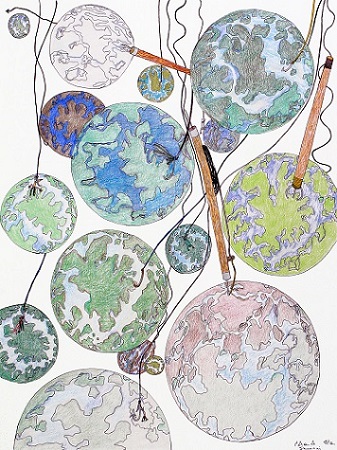Crippled Two-Tongue and the Myth of Benign Translatability
DOI:
https://doi.org/10.25071/1925-5624.40315Abstract
This is an Anishinaabemowin (a.k.a. Ojibwe language) translation story. A story concerning the disabling consequences of Eurocentric translations through the process of redaction, reduction, and refraction of meanings. This story includes baby birds covered in faeces, Ships of Empire, a swamp, an Oracle, a Crippled Two-Tongue, a Tradish Nish, a fraudulent credit card, and one giant animal called Anishinaabemowin that everyone wants to eat but no one wants to share. A story of forced dislocations and the startling journey to re-articulate all the parts of the language. Disclaimer: some baby birds were narratively harmed in the making of this article, but in the end they turn out fine.
References
Anderson, Kim. A Recognition of Being: Reconstructing Native Womanhood. Toronto, ON: Second Story, 2000. Print.
Battiste, Marie Ann, and James Youngblood Henderson. Protecting Indigenous Knowledge and Heritage: A Global Challenge. Saskatoon: Purich Pub, 2000. Print.
Battiste, Marie Ann. Reclaiming Indigenous Voice and Vision. Vancouver: UBC Press, 2000. Print.
Bhabha, Homi K. The Location of Culture. London: Routledge, 1994. Print.
Daly, Mary, and Jane Caputi. Websters’ First New Intergalactic Wickedary of the English Language. Boston: Beacon, 1987. Print.
Deleuze, Gilles, and Félix Guattari. A Thousand Plateaus: Capitalism and Schizophrenia. Minneapolis: University of Minnesota Press, 1987. Print.
Ende, Michael. The Neverending Story. Trans. Ralph Manheim. Illust. Roswitha Quadflieg. Garden City, NY: Doubleday, 1983. Print.
Gebhardt, E. “Introduction to Part III. A Critique of Methodology.” The Essential Frankfurt School Reader. Eds. A. Arato and E. Gebhardt. New York: Continuum, 1982. 371-406. Print.
Hallett, Darcy, Michael J. Chandler, and Christopher E. Lalonde. “Aboriginal Language Knowledge and Youth Suicide.” Cognitive Development 22.3 (2007): 392-99. Web. DOI: https://doi.org/10.1016/j.cogdev.2007.02.001
Itwaru, Arnold, and Natasha Ksonzek. Closed Entrances: Canadian Culture and Imperialism. Toronto: TSAR Publications, 1994. Print.
Kiberd, Declan. Inventing Ireland: The Literature of the Modern Nation. London: Vintage, 1996. Print.
Loomba, Ania. Colonialism-postcolonialism. London: Routledge, 1998. Print.
Maracle, Lee. I Am Woman: A Native Perspective on Sociology and Feminism. Vancouver, BC: Press Gang, 1996. Print.
Norris, M. J. “Aboriginal Languages in Canada’s Urban Areas: Characteristics, Considerations and Implications.” Not Strangers in These Parts: Urban Aboriginal Peoples. Eds. Evelyn J. Peters and David Newhouse. Ottawa: Policy Research Initiative, 2003. Print.
Oliver, Michael. “The Politics of Disablement — Existing Possibilities.” The Politics of Disablement (1990): 95-111. Web. DOI: https://doi.org/10.1007/978-1-349-20895-1_7
Razack, S. H. “Timely Deaths: Medicalizing the Deaths of Aboriginal People in Police Custody.” Law, Culture and the Humanities 9.2 (2011): 352-74. Web. DOI: https://doi.org/10.1177/1743872111407022
Robinson, Douglas. “Tejaswini Niranjana, Retranslation, and the Problem of Foreignism.” Tradterm 4.2 (1997): 149-165. Web. DOI: https://doi.org/10.11606/issn.2317-9511.tradterm.1997.49857
Thomas, William Isaac, and Dorothy Swaine Thomas. The Child in America; Behavior Problems and Programs. New York: A.A. Knopf, 1938. Print.
Titchkosky, Tanya. “Disability Studies: The Old and the New.” Canadian Journal of Sociology / Cahiers Canadiens De Sociologie 25.2 (2000): 197. Web. DOI: https://doi.org/10.2307/3341823
Treuer, Anton. Living Our Language: Ojibwe Tales & Oral Histories. St. Paul, MN: Minnesota Historical Society, 2001. Print.
Downloads
How to Cite
Issue
Section
License

This work is licensed under a Creative Commons Attribution-NonCommercial-NoDerivs 3.0 Unported License.

